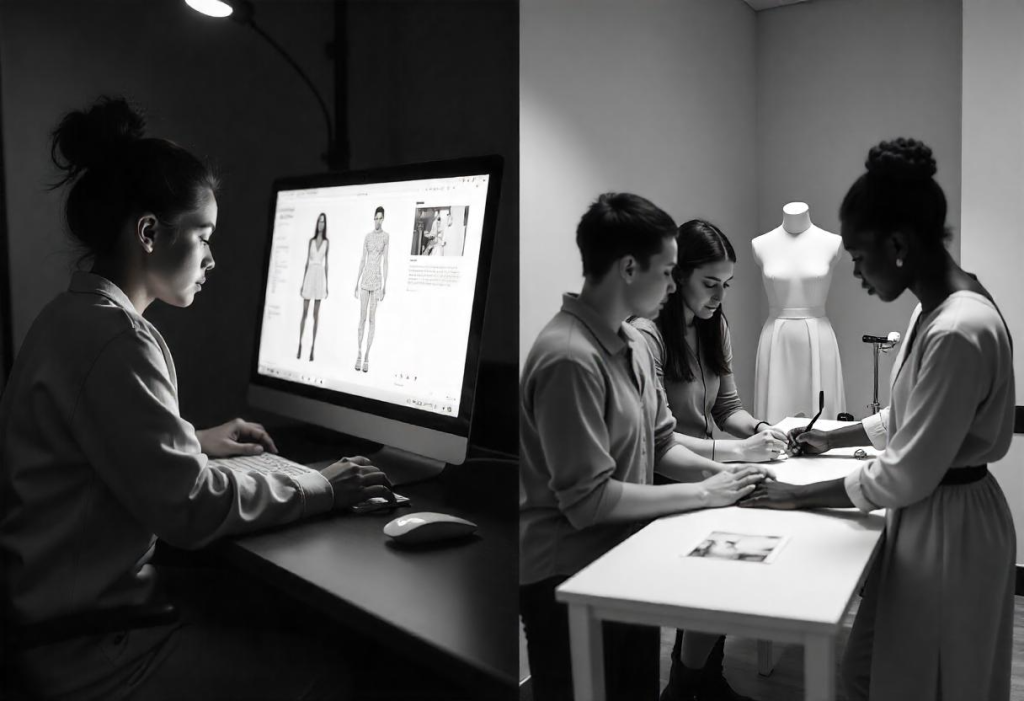Online vs On-Campus Fashion Degrees: Pros & Cons
Are you dreaming of making it big in the world of fashion? Do you imagine seeing your designs walk the runway or fill glossy magazines? If yes, then getting a fashion degree is your first step.
Today, students have the option of learning online or on an offline campus. Do not worry! With this blog, we are here to assist you in comprehending both possibilities and making the best decision for your future.
What is an online fashion degree?
An online fashion degree allows you to study from home. You attend classes on your computer or phone. Teachers deliver lessons through videos, chats, and live sessions. You also submit designs and projects online.
It seems like you’re in a virtual classroom, yet without leaving your house!
Pros of an Online Fashion Degree:
- Study when it’s convenient for you, whether in the morning, evening, or late at night.
- Lower costs include transport, meals, hostel stays, and additional levies.
- Learning from professors and colleagues throughout the world.
- Self-paced learning allows for gradual comprehension of challenging concepts.
Read Also: Why Enrolling in Fashion Design Course Can Transform Your Career
Cons of an Online Fashion Degree:
- Fashion involves sewing, draping, and experimenting. It’s more difficult to practice these at home.
- Limited networking may lead to missed opportunities for personal relationships and networking.
- Organization is essential for staying focused with or without a teacher’s supervision.
- Online access to events, group projects, and fashion displays is limited and lacks campus experience.
What is an On-Campus Fashion Degree?
An on-campus fashion degree means going to an offline college and physical learning. You sit in classrooms, work in labs, and learn face-to-face from teachers. You also take part in shows, exhibitions, and live projects. You live the full “college life,” meeting people every day and learning by doing.
Pros of an On-Campus Fashion Degree:
- Physical learning experience with machines, cutting tables, design software, and other tools.
- Building strong networks by meeting classmates, professors, and guest mentors in person.
- Faculties are available to provide immediate assistance if you have any difficulties.
- Campus culture fosters creativity and inspiration among fashion enthusiasts.
- Attend exciting events such as fashion weeks, contests, internships, and exhibits.
Cons of an On-Campus Fashion Degree:
- Students have to follow a fixed timetable and attend lessons at specific times.
- Costs involved in living near a college, including daily transport, can be a concern.
- Full-time study might limit flexibility, making it challenging to balance other routines.
Read Also: Fashion Communication vs. Fashion Design: What’s the Difference?
How Fashion Education Has Evolved Over the Years
Fashion education has advanced significantly over the last few decades! Fashion was once taught through apprenticeships.
They worked for talented tailors and designers without formal education. Then, dedicated fashion design schools arose in locations such as Paris, London, and Milan. They taught pupils how to develop patterns, sew clothing, and draw designs.
By the 1990s, fashion institutions had included computer skills in their curriculum. Students began studying digital design, CAD tools, and online portfolios. Fashion education has expanded and improved in recent years.
You may learn about sustainable fashion, including eco-friendly clothing.
- Digital Fashion Shows (with 3D models)
- Fashion Marketing and Social Media
- AI and VR in Fashion Design.
The fashion industry is growing swiftly globally, and is full of limitless opportunities!

Read Also: What is Sustainable Fashion, and Why is It Important?
The Future of Fashion Degrees
The future of fashion seems really intriguing! Here’s what to expect in the following years:
- More businesses will promote sustainable designs and ethical clothing.
- Smart fashion includes clothing that changes colors, lights up, and tracks fitness.
- Virtual showrooms allow users to try on garments online using Augmented Reality (AR).
- Fashion Startups: Young designers will launch their own businesses via Instagram and websites.
- Careers combining fashion and technology include gaming, artificial intelligence, and spacewear.
This implies that your fashion degree will lead to a variety of exciting employment, not simply with clothes firms!
Which is Right for You: Online or On-Campus?
Choosing the correct degree relies on your particular preferences and needs. Consider an online fashion degree if you reside in a small town or away from major cities.
- You are efficient at organizing your own schedule.
- You want to save money.
- You have a job or other duties.
- Consider pursuing an on-campus fashion degree if you like hands-on learning.
- You want real-time feedback from professors.
- You want to employ the best fashion labs and tools.
- You like meeting new people and forming networks.
Why AAFT is the Best Place to Study Fashion
If you are dedicated to fashion, you must choose the correct college to help you.
That is why the AAFT is the ideal choice for you!
Here is what AAFT gives you:
Expert-designed fashion courses align with current global trends.
We provide world-class studios and labs, including sewing, fashion styling, and design software.
Famous industry mentors:
Learn from famous designers, stylists, and brand owners.
The course includes experiential learning opportunities such as fashion shows, exhibits, and internships.
Connect with leading brands, labels, and media houses with our placement support.
Gain global exposure by attending foreign fashion weeks and exchange programs.
Focus on future skills such as sustainability, digital fashion, influencer marketing, and personal branding.
At AAFT, you are not a student; you are a future trendsetter!
Read Also: Top 10 Famous Female Models in India
Important Skills You Will Learn in Fashion School
An excellent fashion degree gives you essential skills, whether you want to learn online or on campus.
- Fashion sketches and illustrations: Draw your designs using your hands digitally.
- Textile Knowledge: Understanding various textiles and their applications.
- Pattern Making and Sewing: Transforming a drawing into a wearable garment.
- Fashion Merchandising: Learn to market fashion items.
- Styling and Visual Presentation: Ensure clothing looks its best on individuals and exhibits.
Trend forecasting involves predicting future fashion patterns and clients wants.
More Opportunities After a Fashion Degree
After completing your degree, there are several intriguing employment paths:
- Fashion Designer
- Fashion Stylist
- Textile Designer
- Fashion Buyer
- Fashion Marketer
- Costume Designer for Films and TV
- Sustainable Fashion Expert
- Virtual Fashion Designer for Games
- Fashion blogger or influencer
And, guess what?
Fashion is on the rise worldwide, there is always a place for new talent!
Final Thoughts: Choose Your Path and Shine!
Fashion is beyond clothing. It is about thoughts, emotions, and dreams.
Your commitment is what counts most, regardless of whether you study online or on campus. If you are willing to dream big, work hard, and make magic, the fashion industry is waiting for you.
Read Also: How to Become a Professional Makeup Artist: A Step-by-Step Guide
AAFT will help you every step of the way. With professional instructors, wonderful studios, and a creative campus full of opportunities, your fashion adventure will get off to a great start.
So what are you waiting for? Pick your career, follow your passion, and prepare to become a fashion designer!











